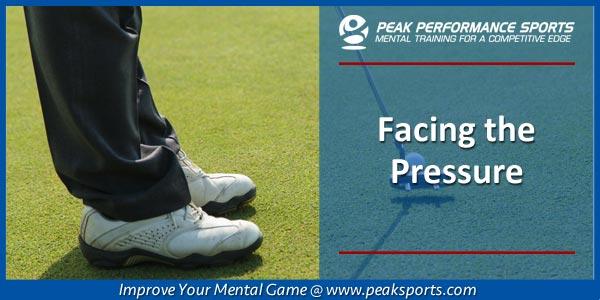
Do You Feel Pressure During Golf?
For many golfers, victory and notoriety often come with a huge pressure to stay on top and continue to excel–think Tiger Woods.
For golfers, a high world ranking often comes with a higher expectation to continuously make cuts and have a change to win.
Despite talent and a strong mental game, even the best athletes sometime succumb to this pressure. They can be consumed with the pressure to be great every week negatively impact their game.
The pressure you and other players feel is self-imposed…
The pressure you feel can affect all parts of your game, not just your mental game. Golfers tend to focus more on their feelings of anxiety.
Thus, you see even the best athletes experience failure at pivotal points in their careers–think Tiger Woods.
Jordan Spieth’s is on top of the golf world, except for this past weekend.
Surprisingly, Jordan Spieth missed his first cut in over three months this past Friday at the Barclays, and with it forfeited his No.1 spot in the Official World Golf Rankings.
Having gained the title only two weeks prior after placing runner-up at Whistling Straits, the loss leaves many wondering if the pressure to stay top dog could be impacting his mental game.
When speaking of his performance, ESPN panelist Jason Sobel said, “He was tired this week sure-maybe more mentally than physically.”
Was it mental or physical fatigue that caused a poor performance?
ESPN’s Bob Harig shared his sentiment on the issue as well. “It was his first missed cut since the Players Championship and he had not been out of the top four since the Memorial. That run is not sustainable — not for anyone — so there had to be a letdown of some sort.”
Maybe he has the Tiger Woods Syndrome now? Does he worry about the pressure to stay on top of his game every week and win? No golfer can be on top of their game every week.
Will Spieth regain his No.1 rank this weekend at the Deutsche Bank Championship?
Spieth seems optimistic. “I’ve reached that peak already and I know it’s going to be close enough to where if I just get the job done next week, I’ll be back in that ranking,” he said following his loss.
Of course, it will be his ability to hold onto this mindset this weekend that can determine his outcome.
Tips for facing the pressure of playing great golf every week include:
Tip 1: When you miss a cut or have a bad day on the course, don’t criticize your game. Instead, think about how you’ll work smarter to regain your form.
Tip 2: When you tee it up, you have to let go of making cuts and instead play each shot with focus, confidence, and trust. Thinking about your score is only important when you sign your card at the end of the day.
Check out our video of the week, How To Boost Your Confidence In Sports And The Confidence Roller Coaster.
Related Sports Psychology Articles
- Is Tiger Woods Suffering From The Yips?
- How Tiger Woods Uses Pressure to Succeed at US Open
- What Motivates Tiger Woods?
*Subscribe to The Sports Psychology Podcast on iTunes
*Subscribe to The Sports Psychology Podcast on Spotify
Download a free sports psychology report to improve your mental game!
Learn more about our one-on-one mental game coaching.
Golfer’s Mental Edge

What’s the big sign that your mental game is the weak link in your golf game? When you can’t play consistently as well as when you play a practice or casual round–or your range game is way better than your game on the course. If you suffer from lack of focus, low self-confidence, poor composure or other mental game obstacles on the course, you can’t reach your true potential in golf.
The Golfer’s Mental Edge 2.0 Audio and Workbook program is ideal for any amateur, collegiate, junior, and tour professional golfer.
Golf coaches and instructors would also be wise to teach “The Golfer’s Mental Edge 2.0” principles to their players. This program is perfect for any golfer who wants to improve performance and consistency by managing their mind better on the course.
